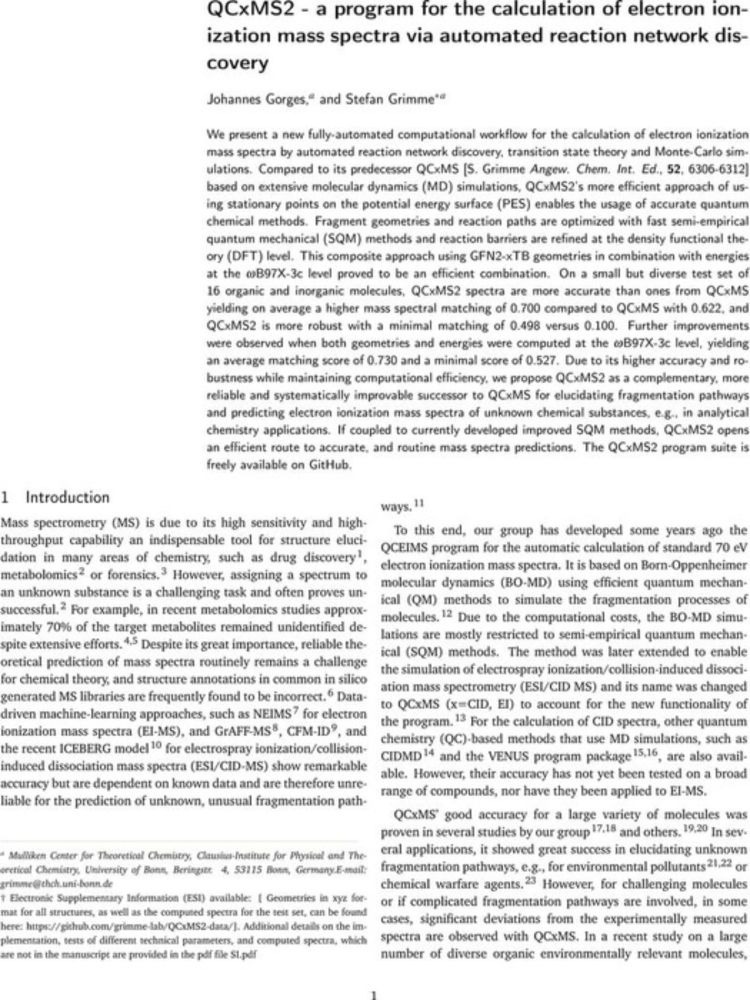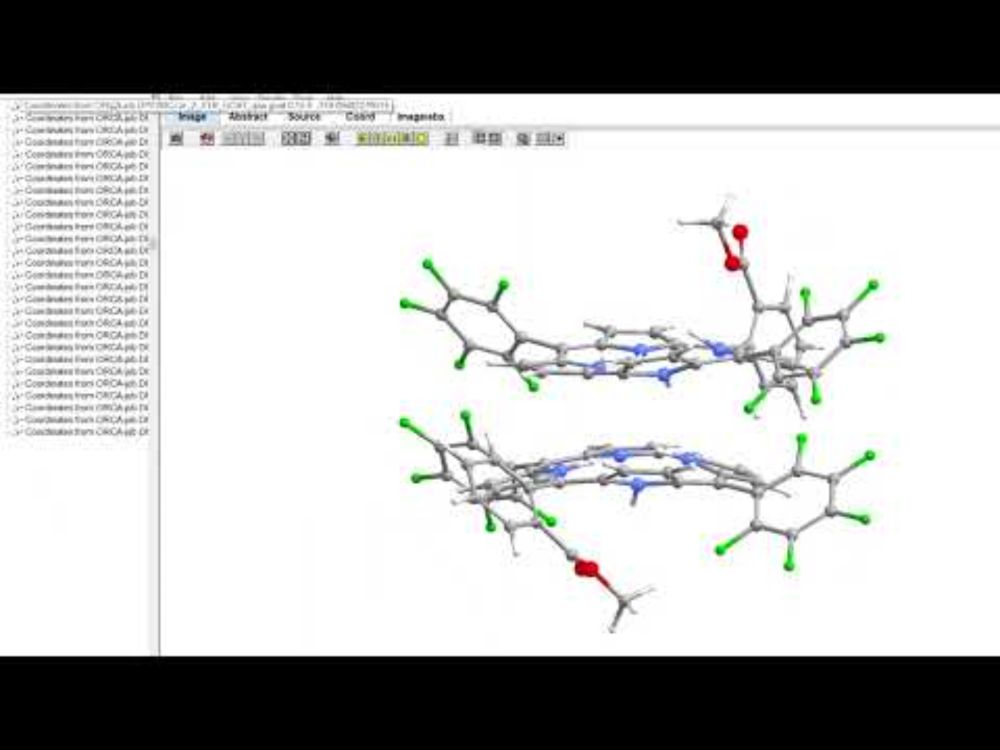
FACCTs at the Analytica 2026
On March 24, #analytica 2026 kicks off in Munich — and we’re excited to be part of it.
Experience #WEASEL, #ORCA, and more live and discover how our solutions elevate your processes to a new level of efficiency.
We look forward to seeing you there
#FACCTs #QuantumChem #Workflows #AnalyticalChem
27.02.2026 09:07 —
👍 3
🔁 2
💬 0
📌 0
With our latest #WEASEL release, it is time to introduce another workflow: the fully automated calculation of rotational barriers for arbitrary molecules, enabling the reliable identification and classification of #atropisomers.
www.faccts.de/weasel/
#FACCTs #Workflows #QuantumChem #CompChem #CADD
19.02.2026 10:24 —
👍 3
🔁 2
💬 0
📌 0

QUICHE Project - FACCTs
The QUICHE project is a UK–Germany Collaboration Bringing Chemistry Software into the Quantum Computing Era
We are proud to be part of the Quantum Integrated Chemistry #QUICHE project, funded by ZIM and Innovate UK. Teaming up with Quantum Motion and Riverlane we strive to enable quantum-ready calculations within #ORCA
Learn more: www.faccts.de/quiche-proje...
#QuantumChem #QuantumComputing #Workflows
04.02.2026 12:40 —
👍 7
🔁 1
💬 0
📌 0

FACCTs at the JCF FJS 2026
Young, curious scientists are our future. That’s why we’re especially delighted to sponsor this year’s #JCF Frühjahrssymposium in our hometown of Cologne. We’re looking forward to meeting many of you there!
symposium.jcf.io
#FACCTs #FJS2026 #JungesChemieForum #GDCh #ORCAqc #OPI #ChemSky
19.01.2026 10:56 —
👍 10
🔁 2
💬 0
📌 0

FACCTs at the CCSC 2026
We’re excited to sponsor this year’s #CCSC2026.
Meet us in Munich to learn more about the latest ORCA features and our ORCA Python Interface #OPI. We’re looking forward to seeing you there!
CCSC: ccsc2026.github.io
ORCA: www.faccts.de/orca/
OPI: github.com/faccts/opi
#FACCTs #ORCAqc #CompChem #ML
12.01.2026 13:24 —
👍 7
🔁 1
💬 0
📌 0

100000 registered ORCA users!
What an incredible Christmas gift!
The #ORCA community has reached a major milestone: 100,000 registered users.
Thank you all for your trust and for being such an important part of ORCA’s journey. Your support is what makes this success possible.
#ORCAqc #FACCTs #MPIKOFO #CompChem #ChemSky
05.01.2026 11:43 —
👍 15
🔁 3
💬 1
📌 1
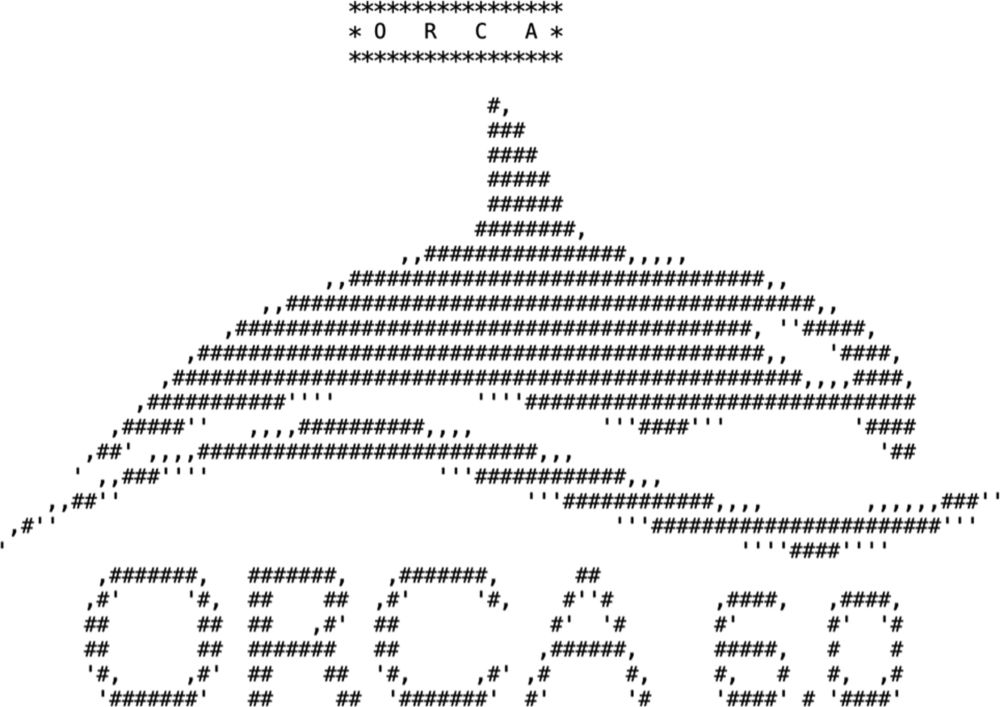
Software Update: The ORCA Program System—Version 6.0
This article describes the philosophy behind- and new features in the ORCA quantum chemistry program suite, version 6.0.
Dear ORCA community,
it took a while, but now the ORCA 6.0 article is out! It serves as generic reference for ORCA 6.x. However, if you are serious about supporting our efforts, please take note of the suggested citations at the end of each ORCA run.
wires.onlinelibrary.wiley.com/doi/10.1002/...
28.04.2025 09:01 —
👍 48
🔁 18
💬 1
📌 1
The accessibility of state-of-the-art quantum chemistry is a core aspect of ORCA. We are therefore particularly proud that ORCA (@FACCTs & @orca-qc-official.bsky.social) is being used in such innovative projects as El Agente. Check it out!
#ORCAqc #CompChem #LLM #QuantumChem #ChemSky
08.05.2025 07:17 —
👍 18
🔁 7
💬 1
📌 0
Reposting for other time zones. In my latest video I show how to parameterize bond length and angle force constants in a semiautomatic fashion using the #orca #compoundscripts module.
I uploaded the files from the video to:
github.com/niconeuman/p...
06.05.2025 13:25 —
👍 14
🔁 3
💬 0
📌 0
Thank you for your outstanding pioneering work for the recognition of computational chemistry, Lisa! It was great to see how much heart and soul you put into this topic. It was an honor and great pleasure to co-author this article.
We wish you good luck and success on your new journey!
07.04.2025 10:09 —
👍 2
🔁 0
💬 1
📌 0
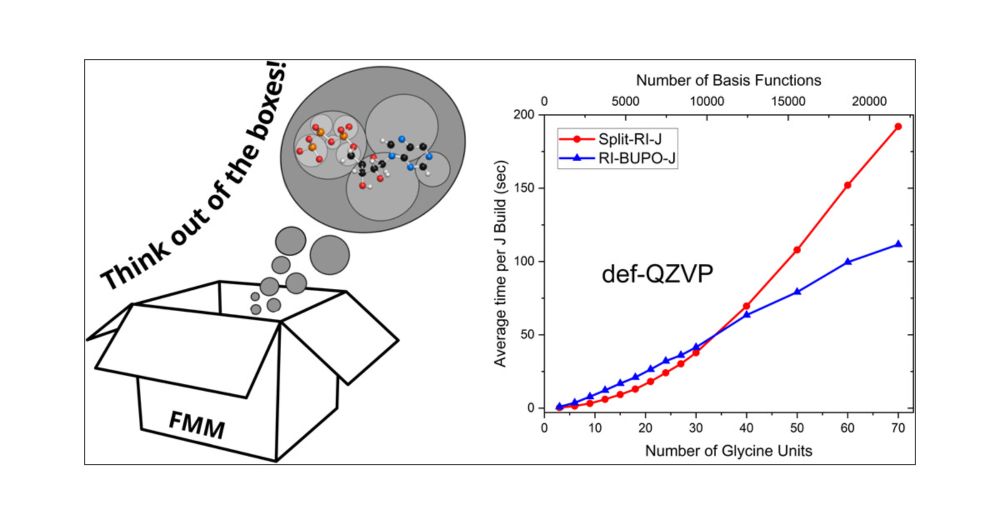
The “Bubblepole” (BUPO) Method for Linear-Scaling Coulomb Matrix Construction with or without Density Fitting
In this work, we describe the development of a new algorithm for the computation of Coulomb-type matrices using the well-known resolution of the identity (RI) or density fitting (DF) approximation. The method is linear-scaling with respect to system size and computationally highly efficient. For small molecules, it performs almost as well as the Split-RI-J algorithm (which might be the most efficient RI-J implementation to date), while outperforming it for larger systems with about 300 or more atoms. The method achieves linear scaling through multipole approximations and a hierarchical treatment of multipoles. However, unlike in the fast multipole method (FMM), the algorithm does not use a hierarchical boxing algorithm. Rather, close-lying objects like auxiliary basis shells and basis set shell pairs are grouped together in spheres that enclose the set of objects completely, which includes a new definition of the shell-pair extent that defines a real-space radius outside of which a given shell pair can be safely assumed to be negligible. We refer to these spheres as “bubbles” and therefore refer to the algorithm as the “Bubblepole” (BUPO) algorithm, with the acronym being RI-BUPO-J. The bubbles are constructed in a way to contain a nearly constant number of objects such that a very even workload arises. The hierarchical bubble structure adapts itself to the molecular topology and geometry. For any target object (shell pair or auxiliary shell), one might envision that the bubbles “carve” out what might be referred to as a “far-field surface”. Using the default settings determined in this work, we demonstrate that the algorithm reaches submicro-Eh and even nano-Eh accuracy in the total Coulomb energy for systems as large as 700 atoms and 7000 basis functions. The largest calculations performed (the crambin protein solvated by 500 explicit water molecules in a triple-ζ basis) featured more than 2000 atoms and more than 33,000 basis functions.
This paper is the start of something big - a new way to use Multipoles in electronic structure calculations. We are extremely excited and proud that this is out now.
pubs.acs.org/doi/10.1021/...
03.03.2025 14:51 —
👍 19
🔁 3
💬 1
📌 2
Quick follow up to the paper: here is GOAT doing a conformational search of a ligand on a protein pocket, including a few waters. The protein was frozen but does not need to be.
All done in ORCA6 using QM/MM for the PES.
Have fun with it! 😀 #compchemsky 🧪
onlinelibrary.wiley.com/doi/abs/10.1...
26.02.2025 10:46 —
👍 22
🔁 8
💬 1
📌 0

The ORCA team is looking for a postdoctoral fellow or Ph.D. student to work on XTB methodology jointly with the group of Prof. Stefan Grimme (University of Bonn).
26.02.2025 09:27 —
👍 8
🔁 3
💬 0
📌 2
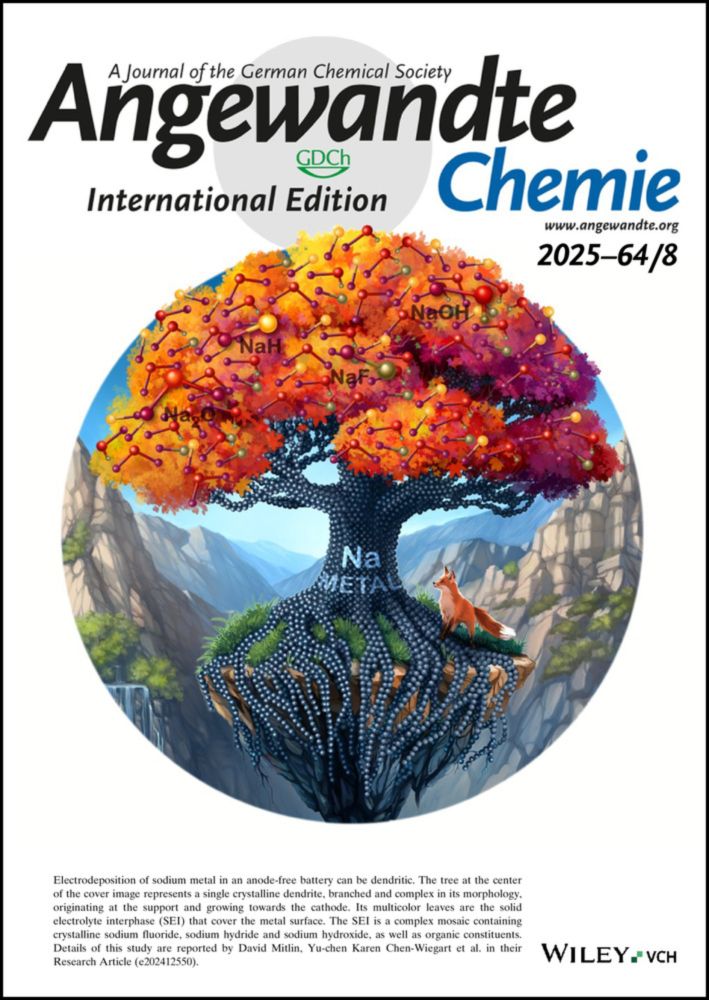
GOAT: A Global Optimization Algorithm for Molecules and Atomic Clusters
In this work, we propose a new Global Optimization Algorithm (GOAT) for molecules and clusters of atoms and show how it can find the global energy minima for both systems without resorting to molecul...
The paper on ORCA 6’s Global Optimization Algorithm GOAT is finally published at Angewandte Chemie! Feel free to try Bernardo's (@bernadsz.bsky.social) algorithm to generate conformer ensembles and much more.
doi.org/10.1002/anie...
Tutorial on GOAT: www.faccts.de/docs/orca/6....
#ORCAqc #ChemSky
19.02.2025 09:23 —
👍 39
🔁 12
💬 4
📌 0
YouTube video by nicolas N
Fluorescence Spectra with Orca
New video on how to calculate #Fluorescence spectra with #Orca using the ESD module! I follow the example for benzene from the manual.
#compchem #chemsky #science
youtu.be/zWzPkqN9SBo
08.02.2025 22:13 —
👍 29
🔁 4
💬 0
📌 1

VWSCC 2025 - YouTube
All recordings from the ORCA workshop at the Virtual Winter School on Computational Chemistry 2025.
All recordings of the ORCA workshop (@faccts-orca.bsky.social & @orca-qc-official.bsky.social) at the VWSCC 2025 (@vwscc.bsky.social) are now available on our YouTube Channel! Thank you to all participants who made it a great success.
www.youtube.com/playlist?lis...
#ORCAqc #ChemSky #VWSCC25
07.02.2025 12:45 —
👍 24
🔁 6
💬 1
📌 0
#ChemSky #QuantumChem
03.02.2025 09:29 —
👍 2
🔁 1
💬 0
📌 0

xTB Workshop VWSCC 2025 by the Grimme group.
Also don't forget the xTB workshop by our friends and close collaborators at the @grimmelab.bsky.social. It will start today 10:00 CET!
31.01.2025 08:50 —
👍 5
🔁 1
💬 0
📌 0
Virtual Winter School on Computational Chemistry - Workshop - ORCA 6
Online congress discussing state of the art computational chemistry
Join us at the free Virtual Winter School on Computational Chemistry and learn more about the features of ORCA 6! The ORCA workshop starts on Thursday, January 30th at 2 pm CET. The program and more information can be found here:
winterschool.cc/program/day-...
#ORCAqc #ORCA6 #VWSCC #ChemSky
17.01.2025 09:56 —
👍 19
🔁 6
💬 1
📌 0

Stefan Grimme receives the 2025 Chemistry Europe Award!
Learn more at https://buff.ly/3BXDVhO.
#ChemistryAward #ChemistryEurope
16.01.2025 07:38 —
👍 68
🔁 11
💬 1
📌 2
We're delighted to announce Stefan Grimme @grimmelab.bsky.social as the recipient of the 2025 Chemistry Europe Award! He'll be recognized "for his groundbreaking contributions that have had a profound impact on the scientific community” at #IUPAC2025.
www.chemistryviews.org/stefan-grimm...
#Chemsky
16.01.2025 09:18 —
👍 72
🔁 11
💬 3
📌 0

FACCTs
FACCTs is bringing the ORCA software to industry - promoting the next Quantum leaps in the Pharma, Materials and Chemical Industries.
Missed the ORCA 6 Release Event? No problem, all talks are now available on our YouTube channel (youtube.com/@faccts_orca), the academic (MPI Kofo) ORCA channel (youtube.com/@orcaquantum...), and the ORCA forum (orcaforum.kofo.mpg.de/app.php/portal).
#ORCAqc #ORCA6 #CompChem #QuantumChem #ChemSky
05.09.2024 10:56 —
👍 4
🔁 3
💬 0
📌 0

Save the date! We (@faccts-orca.bsky.social)will visit the 18th German Conference on Cheminformatics (GCC 2024, @gdch.bsky.social) in Bad Soden am Taunus, Germany from November 3rd to 6th. Visit us to find out more about us and our tools.
#GCC2024 #ORCA6 #CompChem #ChemInformatics #ChemSky
09.09.2024 08:45 —
👍 5
🔁 2
💬 0
📌 0

The first Quantum Mechanics in Pharma meeting starts today! Don't miss Christoph Riplinger’s (@faccts-orca.bsky.social) talk about "High-accuracy QM in life sciences: From drug properties to binding modes" at 15.40 (3:40 pm).
#ORCAqc #ORCA6 #CompChem #QuantumChem #PharmaChem #QMinPharma24 #ChemSky
18.09.2024 08:06 —
👍 6
🔁 3
💬 0
📌 0
YouTube video by nicolas N
Global optimization using Orca6 and GOAT!
New video on using the GOAT method to find global minima with Orca and XTB, for a corrole dimer.
#compchem #chemsky
Pls help me share!
youtu.be/GvTNg2gKuZc
11.09.2024 19:35 —
👍 16
🔁 7
💬 0
📌 0
Nuclear Magnetic Resonance (NMR) - ORCA 6.0 TUTORIALSContentsMenuExpandLight modeDark modeAuto light/dark mode
You want to get started with NMR predictions in ORCA? Check out our NMR tutorial at https//www.faccts....
26.09.2024 15:39 —
👍 4
🔁 2
💬 0
📌 0
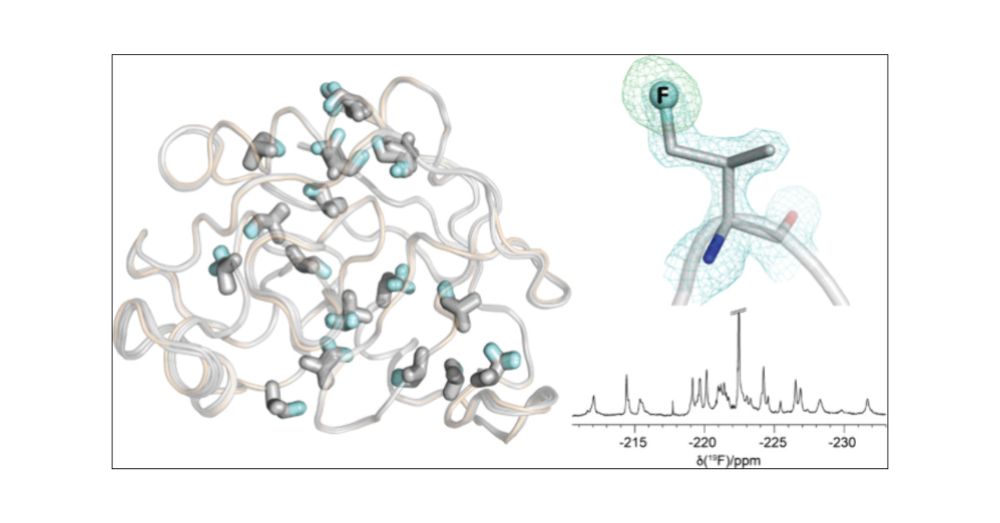
1.3 Å Crystal Structure of E. coli Peptidyl–Prolyl Isomerase B with Uniform Substitution of Valine by (2S,3S)-4-Fluorovaline Reveals Structure Conservation and Multiple Staggered Rotamers of CH2F Groups
(2S,3S)-4-Fluorovaline (FVal) is an analogue of valine, where a single CH3 group is substituted by a CH2F group. In the absence of valine, E. coli valyl-tRNA synthetase uses FVal as a substitute, enabling the production of proteins uniformly labeled with FVal. Here, we describe the production and analysis of E. coli peptidyl–prolyl isomerase B where all 16 valine residues have been replaced by FVal synthesized with a 13C-labeled CH2F group. Although the melting temperature is lower by about 11 °C relative to the wild-type protein, the three-dimensional protein structure is almost completely conserved, as shown by X-ray crystallography. The CH2F groups invariably populate staggered rotamers. Most CH2F groups populate two different rotamers. The increased space requirement of fluorine versus hydrogen does not prohibit rotamers that position fluorine next to a backbone carbonyl carbon. 19F NMR spectra show a signal dispersion over 25 ppm. The most high-field shifted 19F resonances correlate with large 3JHF coupling constants, confirming the impact of the γ-gauche effect on the signal dispersion. The present work is the second experimental verification of the effect and extends its validity to fluorovaline. The abundance of valine in proteins and structural conservation with FVal renders this valine analogue attractive for probing proteins by 19F NMR spectroscopy.
NMR properties are an important part of the spectroscopic toolbox of ORCA 6 (@faccts-orca.bsky.social & MPI Kofo). Jackson, Otting and coworkers recently used calculated 19F NMR properties to study structural effects in proteins.
doi.org/10.1021/acs....
#ORCAqc #ORCA6 #NMR #ChemSky #CompChem
26.09.2024 15:37 —
👍 6
🔁 5
💬 1
📌 0












